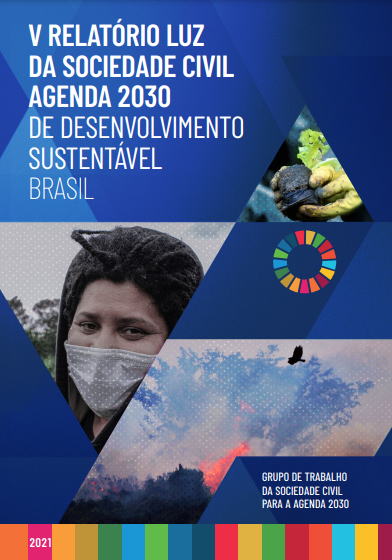Report shows that Brazil did not advance in 2030 Agenda Goals
16/07/2021
Nathállia Gameiro
Data from Relatório Luz 2021 show that Brazil did not make any progress in the 17 Sustainable Development Goals (SDG) of United Nations’ 2030 Agenda. The 5th edition of the report was published on Monday (July 12th), in a public meeting of the Chamber of Deputies.
 The document is prepared by the Civil Society Working Group, which consists of 57 organizations and boards from all over the country. One hundred and six specialists from several fields analyze the implementation of the SDG in Brazil, and make recommendations so the country can reach the goal by 2030, fulfilling its commitment with the UN. This year, none of the 169 goals had a sufficient progress: 92 of them had setbacks, 27 are stalled and 13 show unsatisfactory progress. The other goals were not mentioned due to insufficient data.
The document is prepared by the Civil Society Working Group, which consists of 57 organizations and boards from all over the country. One hundred and six specialists from several fields analyze the implementation of the SDG in Brazil, and make recommendations so the country can reach the goal by 2030, fulfilling its commitment with the UN. This year, none of the 169 goals had a sufficient progress: 92 of them had setbacks, 27 are stalled and 13 show unsatisfactory progress. The other goals were not mentioned due to insufficient data.
“There is a life behind each number, a person being left behind. There are black people, women, indigenous people, a vulnerable person. Our main goal is to remind everyone that in each piece of data there are people, rivers, forests and the environment involved”, the representative of the Civil Society Working Group for the 2030 Agenda, Welinton Pereira, pointed out.
Brazil presents setbacks in at least 9 of the 17 goals in the following areas: the environment, the creation of peaceful and inclusive societies, handling of poverty and hunger. The return of Brazil to the Hunger Map, the growth in poverty, environmental policies that go against sustainable development, the regression of gender equality policies and the shrinkage of health and education programs are some of the examples highlighted by the more than 20 persons who attended the event.
Researcher Rômulo Paes, member of Fiocruz’s Strategy for the 2030 Agenda, emphasized the importance of the report in advocating for better public policies, and for a re-institutionalization so that Brazil can recover its capacity and competence in the public sector to intervene in multiple areas that need intervention. In his opinion, the document also highlights the setback from the legal perspective, which hinders the implementation of public policies and the creation of an organized social response to the challenges in facing the pandemic, as well as financing and governance, which are important key issues, according to the researcher.
“In Brazil, we are experiencing a huge struggle in facing the pandemic, which entails the escalation of multiple tendencies that were already set, by the country’s setback in the urge to find inclusive and sustainable development, as well as the translation of this impact in the several forms of political-administrative organizations in the country”, he stated.
The report shows that, since the pandemic started, 27 million people started living in extreme poverty; 14.4 million people are unemployed; 19 million people are starving; 113 million live with food insecurity, not knowing if they will be able to have food in the next day; 5.1 million children are out of school; 4.4 million children do not have access to a cellphone or computer for online classes; 39% of schools do not have basic sanitation; and violent deaths within the LGBTQIA+ community increased by 29% as compared to 2019.
For the attendees of the meeting, the public policies and legislations are not aligned with the SDGs. They argued that the Spotlight Report may contribute to monitoring and assessment, and that the 2030 Agenda and the SDGs may be tools to stimulate the implementation of coherent public policies that aim at solving the country’s development issues and at offering opportunities and conditions for the citizens to develop their own potentials. The meeting was streamed live and you can access it here.




